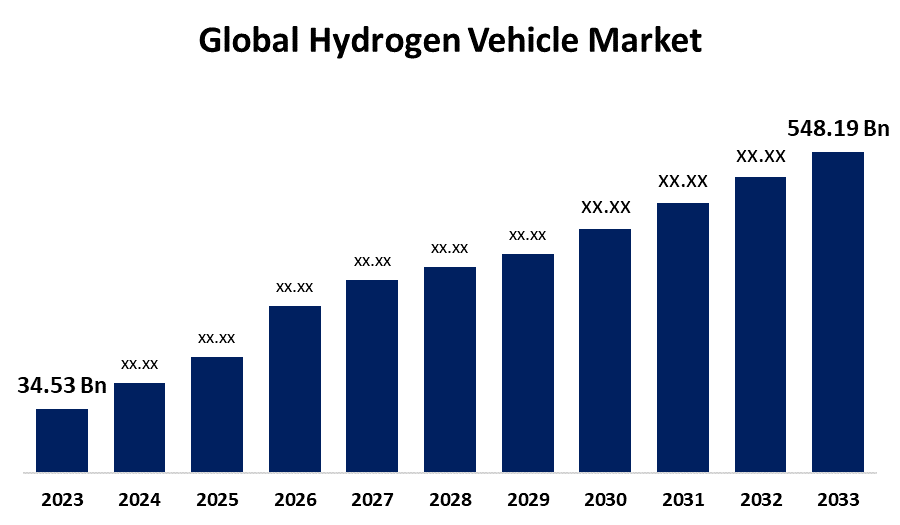Global Hydrogen Vehicle Market Size, Share, and COVID-19 Impact Analysis, By Vehicle Type (Passenger Cars and Commercial Vehicle), By Powertrain Configuration (Fuel Cell Electric Vehicle (FCEV) and Hybrid Vehicle), and By Region (North America, Europe, Asia-Pacific, Latin America, Middle East, and Africa), Analysis and Forecast 2023 - 2033.
Industry: Automotive & TransportationGlobal Hydrogen Vehicle Market Insights Forecasts to 2033
- The Global Hydrogen Vehicle Market Size was Valued at USD 34.53 Billion in 2023
- The Market Size is Growing at a CAGR of 31.85 % from 2023 to 2033
- The Worldwide Hydrogen Vehicle Market Size is Expected to Reach USD 548.19 Billion by 2033
- Asia Pacific is Expected to Grow the fastest during the forecast period.

Get more details on this report -
The Global Hydrogen Vehicle Market Size is Anticipated to Exceed USD 548.19 Billion by 2033, Growing at a CAGR of 31.85 % from 2023 to 2033.
Market Overview
The vehicles that use hydrogen as an onboard fuel to move are known as hydrogen vehicles. The powertrains of hydrogen-powered vehicles use either internal combustion engine combustion to convert hydrogen's chemical energy to mechanical energy, or fuel cell oxidation to power electric motors. Hydrogen vehicles can be mainly categorized into two types: hydrogen fuel cell vehicles (which operate like electric cars) and hydrogen combustion vehicles (which operate equally to gasoline cars). As a fossil fuel that is not renewable, gasoline is predicted to run out shortly. The development of alternative fuel sources for gasoline is crucial. This includes the use of electric and hydrogen vehicles, which are more cost-effective than conventional vehicles and run-on gasoline. Governments offer financial incentives and grants to encourage the purchase and use of hydrogen vehicles. These involve tax credits, rebates, grants, and direct subsidies that decrease the open prices or operating costs related to hydrogen vehicles. Growing environmental degradation and reduction of fossil fuel resources, concerns of government bodies to decrease the releases of harmful gases and growing acceptance of technological improvements are possible to drive the growth of the hydrogen vehicle market during the prediction period. Numerous policies have been arranged by diverse governments to provide for environmental conditions.
Report Coverage
This research report categorizes the market for the global hydrogen vehicle market based on various segments and regions forecasts revenue growth and analyzes trends in each submarket. The report analyses the key growth drivers, opportunities, and challenges influencing the global hydrogen vehicle market. Recent market developments and competitive strategies such as expansion, product launch, and development, partnership, merger, and acquisition have been included to draw the competitive landscape in the market. The report strategically identifies and profiles the key market players and analyses their core competencies in each sub-segment of the global hydrogen vehicle market.
Global Hydrogen Vehicle Market Report Coverage
| Report Coverage | Details |
|---|---|
| Base Year: | 2023 |
| Market Size in 2023: | USD 34.53 Billion |
| Forecast Period: | 2023-2033 |
| Forecast Period CAGR 2023-2033 : | 31.85 % |
| 2033 Value Projection: | USD 548.19 Billion |
| Historical Data for: | 2019-2022 |
| No. of Pages: | 233 |
| Tables, Charts & Figures: | 110 |
| Segments covered: | By Vehicle Type, By Powertrain Configuration, By Region, By Region |
| Companies covered:: | Toyota Motor Corporation, Honda Motor Corporation, BMW, SAIC Motor Company, Hyundai Motor Company, Kia Motor Corporation, Groupe Renault, Cummins Inc., Ashok Leyland, Hydrogenics, Daimler AG (Mercedes-Benz), General Motors Company, Mazda Motor Corporation, Tata Motors Limited, and, Others |
| Pitfalls & Challenges: | Covid-19 Empact, Challenges, Growth, Analysis. |
Get more details on this report -
Driving Factors
Rising CO2 release in combination with strict regulations being expressed to control the release of such harmful gases. Hydrogen and oxygen interact in a fuel cell to make water, a clean byproduct, which is because hydrogen-powered vehicles are capable of reducing carbon dioxide emissions. Because hydrogen vehicles are environmentally friendly, there is a growing demand for them, which is driving the market for hydrogen vehicles to increase. Furthermore, public awareness and environmental perception are vital factors boosting the acquisition of supportable transportation resolutions, such as hydrogen vehicles. In addition, strict government regulations to regulate the carbon releases from vehicles are another factor anticipated to surge in the demand for hydrogen vehicles during the predicted timeframe.
Restraining Factors
The initial cost of hydrogen vehicles is a significant barrier to the market. Around this time, infrastructure development, hydrogen storage systems, and fuel cell technologies are quite expensive. Since fuel cells are the main component of hydrogen cars, advanced technical techniques and materials are needed. These factors drive up the price of fuel cell systems, which makes them a significant part of the total cost of a vehicle.
Market Segmentation
The global hydrogen vehicle market share is classified into vehicle type and powertrain configuration.
- The passenger cars segment is anticipated to hold the largest share of the global hydrogen vehicle market during the forecast period.
On the basis of the vehicle type, the global hydrogen vehicle market is divided into passenger cars and commercial vehicle. Among these, the passenger cars segment is anticipated to hold the largest share of the global hydrogen vehicle market during the forecast period. The rising acquisition of hydrogen-powered passenger cars can be attributed to environmental problems, infrastructure development, technological developments, automaker commitment, government support, pilot programs, demonstrations, and partnerships between industry investors. Hydrogen-powered passenger cars provide customers with a sustainable and effective manner of transportation, propelling the market growth. Governments across the globe are also executing policies, incentives, and subsidies to encourage the acceptance of hydrogen-powered vehicles, like passenger cars. These measures’ purpose is to accelerate the expansion of the market, decrease releases, and encourage a maintainable transportation ecosystem.
- The fuel cell electric vehicle (FCEV) segment is anticipated to hold the highest share of the global hydrogen vehicle market during the forecast period.
On the basis of the powertrain configuration, the global hydrogen vehicle market is divided into fuel cell electric vehicle (FCEV) and hybrid vehicle. Among these, the fuel cell electric vehicle (FCEV) segment is anticipated to hold the highest share of the global hydrogen vehicle market during the forecast period. This growth can be credited to the growing awareness of the worsening air quality and the unnecessary noise evolving from public and private vehicles. The significantly fast shift from conventional fuel vehicles to eco-friendly replacements in recent years is improving the demand for FCEVs. Stringent environmental regulations, government incentives and subsidies encouraging the use of clean fuel, and a rise in harmful gas releases from combustion engine vehicles are a few factors that are projected to drive the growth of the hydrogen vehicle market.
Regional Segment Analysis of the Global Hydrogen Vehicle Market
- North America (U.S., Canada, Mexico)
- Europe (Germany, France, U.K., Italy, Spain, Rest of Europe)
- Asia-Pacific (China, Japan, India, Rest of APAC)
- South America (Brazil and the Rest of South America)
- The Middle East and Africa (UAE, South Africa, Rest of MEA)
North America is anticipated to hold the largest share of the global hydrogen vehicle market over the predicted timeframe.

Get more details on this report -
North America is anticipated to hold the largest share of the global hydrogen vehicle market over the predicted timeframe. Nations present in the North America region are predicted to be involved in global partnerships and knowledge exchange to accompany market growth. The distribution of best practices, research findings, and technological developments can aid all the nations involved. Encouraging partnerships and collaborations across government agencies, industry players, and research institutes in North America to promote the development and use of hydrogen-powered commercial vehicles can help enhance market expansion. These partnerships seek to increase knowledge, distribute resources, and boost industry innovation. The availability of cutting-edge technology and the growing automation need in the US are expected to increase hydrogen vehicle sales. To support growth potential in the automation industry and promote the development of more environmentally friendly and efficient products, the United States embraced several cutting-edge automation technologies.
Asia-Pacific is anticipated to grow at the fastest rate in the global hydrogen vehicle market over the predicted timeframe. Asia Pacific is anticipated to make significant progress as a result of the region's high vehicle production and demand. Furthermore, the growth of the automotive manufacturing industry in nations like South Korea and Japan has not diminished their steadfast support for hydrogen fuel cell technology. Additionally, as the working class expands in these nations, it also affects the average person's financial freedom. These factors propel the expansion of the hydrogen vehicle market over the predicted timeframe in this region.
Competitive Analysis:
The report offers the appropriate analysis of the key organizations/companies involved within the global hydrogen vehicle market along with a comparative evaluation primarily based on their product offering, business overviews, geographic presence, enterprise strategies, segment market share, and SWOT analysis. The report also provides an elaborative analysis focusing on the current news and developments of the companies, which includes product development, innovations, joint ventures, partnerships, mergers & acquisitions, strategic alliances, and others. This allows for the evaluation of the overall competition within the market.
List of Key Companies
- Toyota Motor Corporation
- Honda Motor Corporation
- BMW
- SAIC Motor Company
- Hyundai Motor Company
- Kia Motor Corporation
- Groupe Renault
- Cummins Inc.
- Ashok Leyland
- Hydrogenics
- Daimler AG (Mercedes-Benz)
- General Motors Company
- Mazda Motor Corporation
- Tata Motors Limited
- Others
Key Target Audience
- Market Players
- Investors
- End-users
- Government Authorities
- Consulting And Research Firm
- Venture capitalists
- Value-Added Resellers (VARs)
Recent Developments
- In November 2022, Ballard Power Systems increased its mark in Norway by opening a new office in Oslo. Ballard Norge AS is committed to assisting its rising custom and zero-emission projects in Europe as part of its developing operations there.
- In April 2021, Alstom supported its presence in the global market with the acquisition of Helion Hydrogen Power. This inventiveness aided the company in developing its portfolio of modest and innovative resolutions.
Market Segment
This study forecasts revenue at global, regional, and country levels from 2020 to 2033. Spherical Insights has segmented the global hydrogen vehicle market based on the below-mentioned segments:
Global Hydrogen Vehicle Market, By Vehicle Type
- Passenger Cars
- Commercial Vehicle
Global Hydrogen Vehicle Market, By Powertrain Configuration
- Fuel Cell Electric Vehicle (FCEV)
- Hybrid Vehicle
Global Hydrogen Vehicle Market, By Regional
- North America
- US
- Canada
- Mexico
- Europe
- Germany
- Uk
- France
- Italy
- Spain
- Russia
- Rest of Europe
- Asia Pacific
- China
- Japan
- India
- South Korea
- Australia
- Rest of Asia Pacific
- South America
- Brazil
- Argentina
- Rest of South America
- Middle East & Africa
- UAE
- Saudi Arabia
- Qatar
- South Africa
- Rest of the Middle East & Africa
Frequently Asked Questions (FAQ)
-
1. Which region holds the largest share of the global hydrogen vehicle market?North America is anticipated to hold the largest share of the global hydrogen vehicle market over the predicted timeframe.
-
2. Who are the key players in the global hydrogen vehicle market?The key players in the global hydrogen vehicle market are Toyota Motor Corporation, Honda Motor Corporation, BMW, SAIC Motor Company, Hyundai Motor Company, Kia Motor Corporation, Groupe Renault, Cummins Inc., Ashok Leyland, Hydrogenics, Daimler AG (Mercedes-Benz), General Motors Company, Mazda Motor Corporation, Tata Motors Limited, and Others.
-
3. What is the market for global hydrogen vehicle market?The Global Hydrogen Vehicle Market Size is Expected to Grow from USD 34.53 Billion in 2023 to USD 548.19 Billion by 2033, at a CAGR of 31.85 % during the forecast period 2023-2033.
Need help to buy this report?